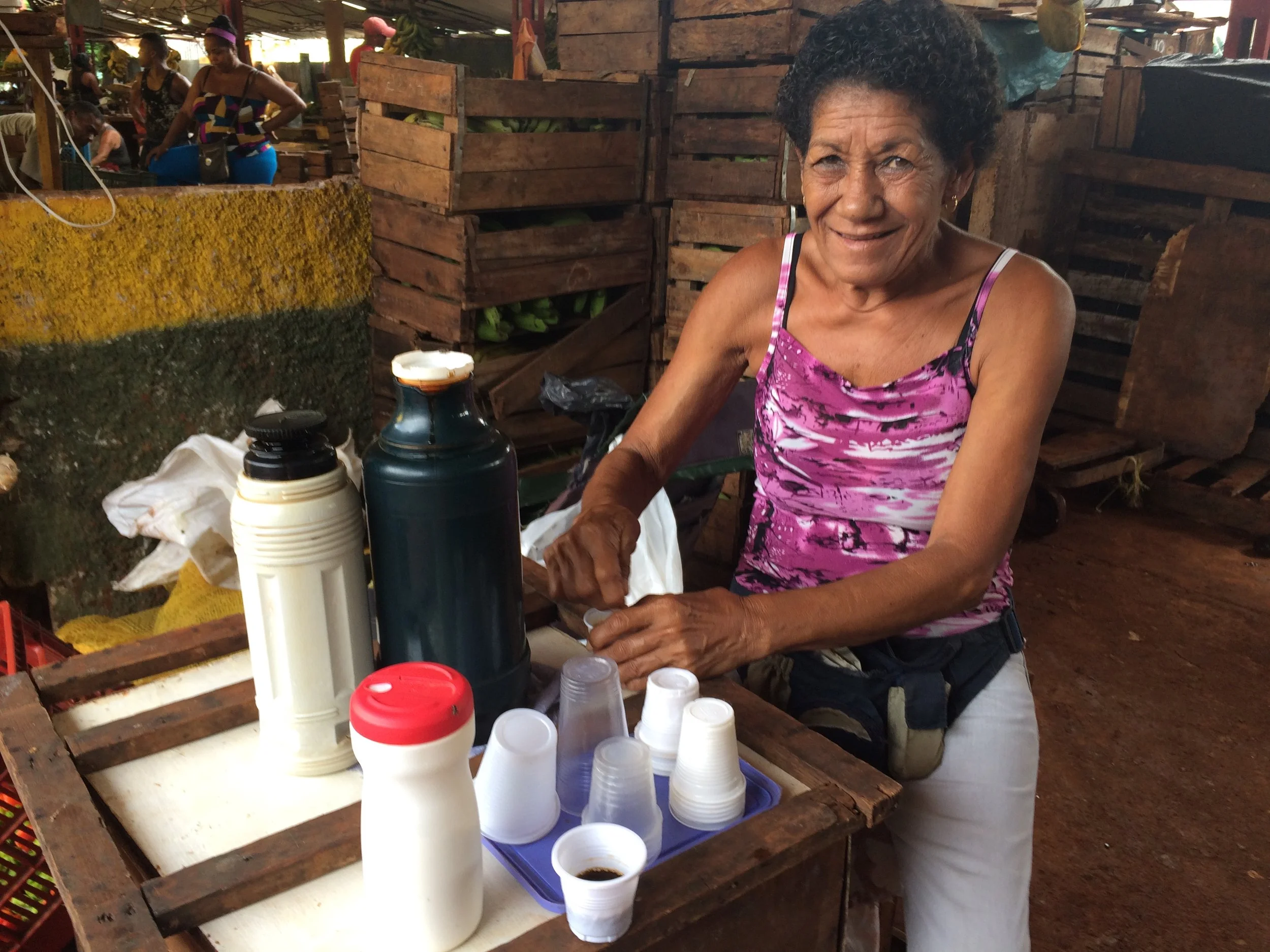I spend about five to six hours of my week buying food for my family, because in Cuba, there is no one-stop supermarket like Safeway or Whole Foods. (Even daring to put the words "Whole Foods" and "Cuba" in the same sentence seems comical, or tragic ... or both!) Instead, there is a complicated mix of farmer's markets, state-owned shops, street side vendors, and black market vendors that I navigate to keep my family well-fed.
I often go to an agro, or farmer's market, near us. It's named after its cross streets -- "42nd and 19th." When I am in California (where I grew up), I go to a Saturday farmer's market where Craig, the kids, and I stroll from booth to booth tasting samples of honey, tamales, and artisanal gelato. 42nd and 19th is not that place. I don't bring my kids here, if I can help it. For starters, the agro looks like a jail, imprisoning bananas behind its iron bars. My flip-flops are caked with mud by the end of the journey. As you approach the entrance, you notice the surreptitious vendors, rapping quietly and quicker than Tupac: "papapapapapa" "langostacamaronespescado." They're hustlers of a different kind, selling products generally only available on the black market: potatoes and lobster, shrimp, and fish. (Note to self: write a poem based on their rhymes someday.) Occasionally, I'll buy potatoes from these guys, but nothing else, because I'm not about to feed my kids seafood from a dubious source.
I go to 42nd and 19th for the convenience -- it's relatively near my home and it has a relatively wide selection of produce. It's still a far cry from what you might find at any average supermarket produce section in most countries, but it's way better than most other markets in Cuba, which sell a monoculture of a half-dozen or so produce items. There is a pork butcher here too, but he doesn't refrigerate his meat, so I prefer to buy my pork elsewhere. No other meats are available at this market, because the farmer's markets are made up of private vendors, and the state controls the sale of all other meat/fish/poultry. (More about this in coming posts.)
Everything at the market is local -- which sounds kind of romantic at first, until you realize that means there are no apples. Nor oranges, except for super sour ones used to marinate meat. Grapes occasionally pop up, but they are just as acidic and my kids pucker and wrinkle their noses at the thought of them. There are also no strawberries nor berries of any kind. Nor pears, peaches, apricots, nor cantaloups nor honeydews. We have learned to live without all of these fruits, staples of my childhood growing up in California.
Bananas are reliably available throughout the year, in all kinds of different varieties. What else you can find depends on the season. In the spring, a brief two-week burst of lychees comes and goes, a fruit so exotic and such a nice change from the never-ending pineapples, papayas, guavas, and coconuts that I bought them by the bushel and froze them in zip-lock bags in one of our three fridges. In the summer, the market is practically all mangoes and avocados. Now, in early fall with the temperatures slightly cooler by a hair, you can occasionally find grapefruit and leafy green vegetables like bok choy and a variety of spinach with bright purple flowers, among the bananas and root vegetables. It is difficult to find tomatoes, carrots, and onions this time of year.
I usually go on Tuesday mornings, as that is when you can generally find the best selection of fruits and vegetables. It's a mess on the weekends and like many other farmer's markets in Cuba, it's closed on Mondays. It takes me about an hour of careful browsing and negotiating to buy what I need, and I've learned never to take a list anymore because a shopping list is really a wish list in Cuba. I look for what's fresh and think about recipes after I shop, rather than the other way around.
I love this vendor's fan, keeping her cool in the sweltering heat.
I usually spend about an hour and $10 on everything -- it's cheap for me, but a fortune for most Cubans, many of whom rely on state-provided salaries of $25 per month, remittances, and "inventando" -- inventing --whatever they can. Most come lugging a big knapsack or makeshift pushcarts and take public transportation to and from the market, because cars (even the Old 1950s Chevys) are rare luxuries.
A retired lady at the back of the market sells good espresso, from a thermos and sold in rare plastic cups that she reuses. She tells me she gets her coffee from her relatives in the Oriente (the east of the island) who mail it to her to supplement her paltry pension of less than $10 per month (this is one example of inventing). A cup of her espresso costs 1 Cuban peso, or 5 cents. At the end of my shopping trip, I need a jolt of caffeine to carry everything back to the trunk of my car!
Ten dollars -- almost half of the monthly government salary -- gets us this much food.
Cuban espresso for 1 Cuban peso (5 cents) in rare plastic cups!





